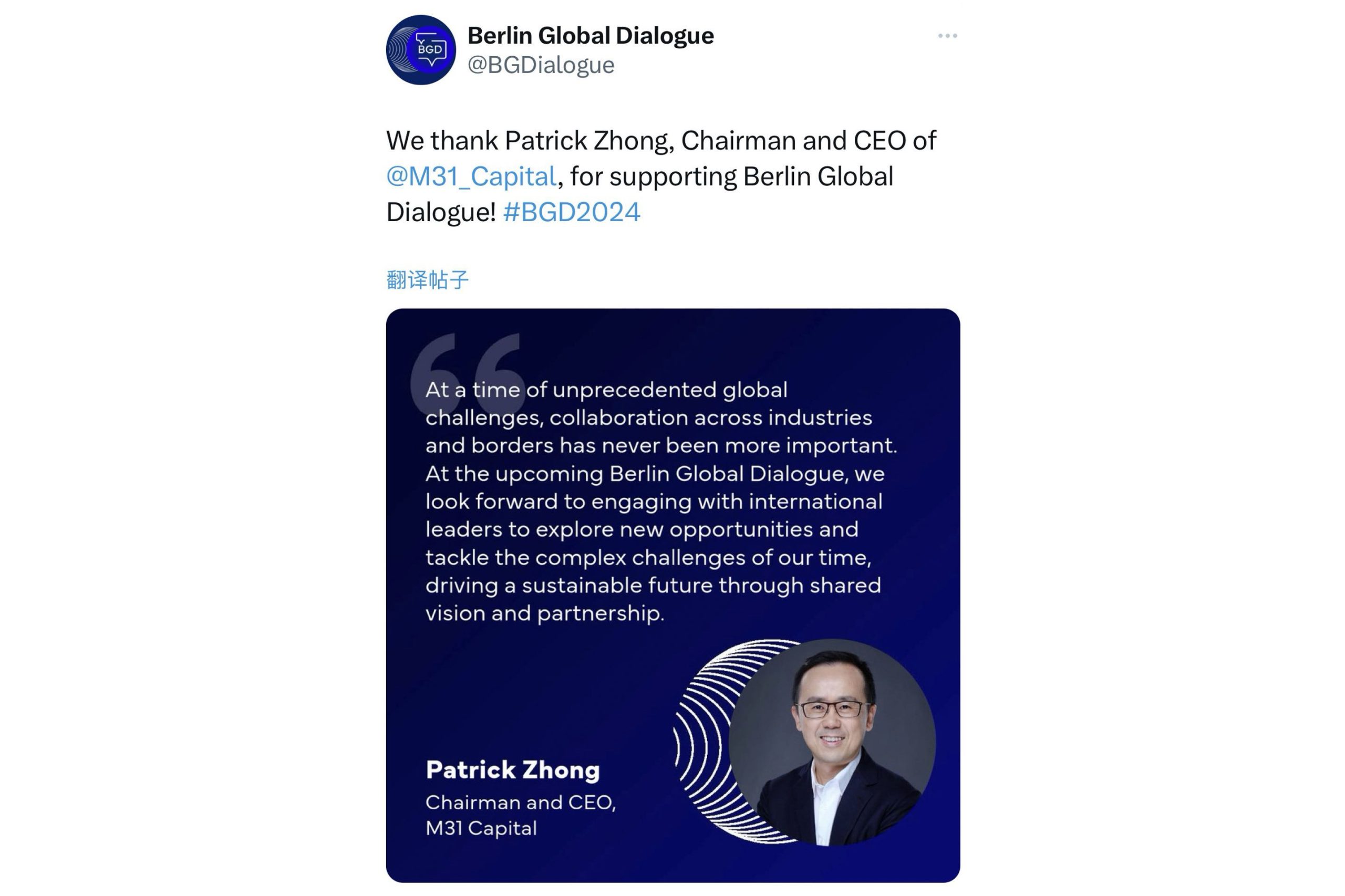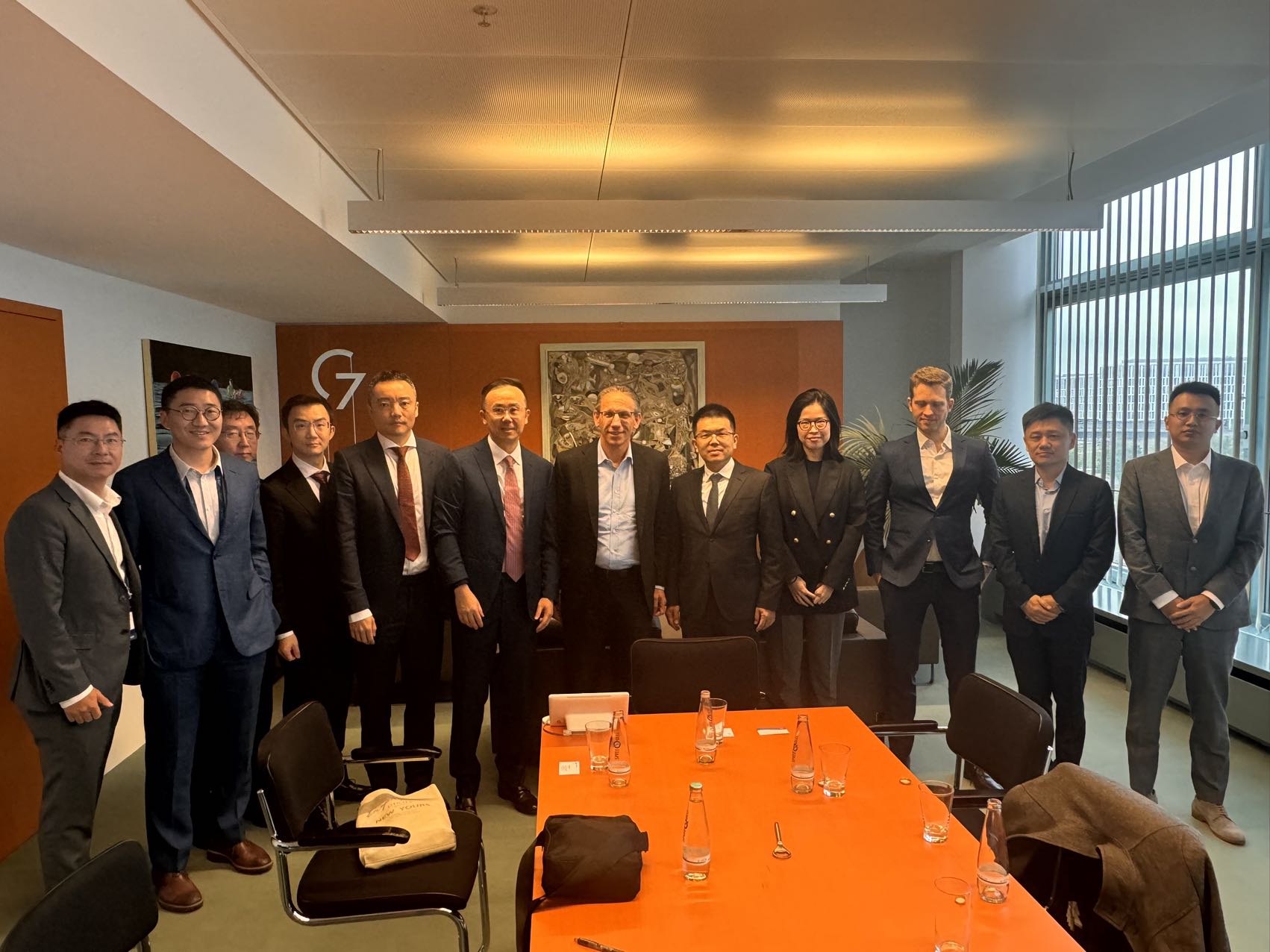• The 2024 Berlin Global Dialogue, held from October 1-2, brought together more than 1,200 global leaders, including French President Emmanuel Macron, Germany’s Vice Chancellor, finance ministers, and top CEOs.
• Patrick Zhong, Founding Managing Partner of M31 Capital, was a speaker at the Leaders’ Dialogue, advocating for a “borderless mindset” in addressing cross-border challenges.
• M31 Capital led an elite group of Chinese CEOs to the summit, organizing exclusive side meetings that facilitated engagement between Chinese entrepreneurs and international political and business leaders.
• The nine-member Chinese delegation, representing sectors such as renewable energy, robotics, and AI, contributed valuable insights during internal discussions.
In an effort to foster global cooperation and communication, M31 Capital facilitated the participation of senior Chinese CEOs and executives in the 2024 Berlin Global Dialogue.

This year’s Berlin Global Dialogue attracted over 1,200 participants, including French President Emmanuel Macron, Germany’s Vice Chancellor, the Prime Minister of Albania, and finance ministers from Germany, Saudi Arabia, and Turkey. The event also included CEOs from prominent companies such as Mercedes-Benz, Siemens, BlackRock, and Allianz. The theme “Building Common Ground” focused on improving collaboration between governments and businesses in a fragmented world.

During the two-day conference, Patrick Zhong actively engaged in the Leaders’ Dialogue, sharing his insights with a global audience. Additionally, M31 Capital organized exclusive meetings that allowed Chinese entrepreneurs to connect with global figures such as Sigmar Gabriel, former German Vice Chancellor, Jörg Kukies, State Secretary at the German Chancellery, and Arancha González Laya, former Spanish Foreign Minister.
Patrick Zhong Calls for a ‘Borderless Mindset’ to Address Cross-Border Issues
In a panel discussion titled “Rethinking Resilience: Responding to Geopolitical Shifts with Industrial Policy,” Patrick Zhong spoke alongside figures such as Lars-Hendrik Röller, founder and chair of the Berlin Global Dialogue, Merit Janow, Chair of Mastercard, and Anish Shah, CEO of Mahindra. During the panel, Patrick addressed the risks of trade protectionism and emphasized the importance of a “borderless mindset” to tackle global issues.

Patrick stated that the world has increasingly focused on the negative impacts of globalization since the onset of COVID-19, leading many countries to erect trade barriers in an attempt to protect their domestic industries. “During the Great Depression, the U.S. was running a trade surplus for every year during the most difficult ten years. Trade was declining and every country put up high tariffs trying to protect from job losses,” he recalled.
He warned that “if every country starts implementing trade barriers, it will create a damaging environment that will hinder economic growth.” Patrick further shared his belief that the key to managing the global crisis is to “see the future trend beyond the present event.” He mentioned a conversation with Larry Summers, former U.S. Treasury Secretary, who noted that people spend “80% of their time on events and only 20% on major trends.”
Patrick also suggested that decision-makers, business leaders, and entrepreneurs should travel globally—to India, the U.S., China, and Europe—to gain a comprehensive understanding of the global business landscape.
Exploring Europe’s Challenges and Strengthening Middle Eastern Cooperation
To gain insights into international market trends, M31 Capital organized side meetings with global leaders, including Jörg Kukies, Sigmar Gabriel, Faisal F. Alibrahim (Saudi Arabia’s Minister of Economy and Planning), Arancha González Laya, and Cornelius Boersch (Founder of Mountain Partners AG). These meetings facilitated discussions on global economic challenges, trade barriers, and future industry prospects.

The five side meetings brought out several key insights:
- There is broad consensus that trade barriers lead to a no-win situation, underscoring the need for equitable cooperation globally.
- European countries are facing the challenge of balancing political and economic relations between the U.S. and China while striving to protect their local industries within an open market framework.
- Investment cooperation between the Middle East and China is growing stronger, with a focus on deepening collaboration, particularly through technological innovation.
Arancha González Laya, former Spanish Foreign Minister, highlighted that while European countries promote market openness, they also demand reciprocal transparency. Many Chinese companies are investing in Europe and developing industries, much like European companies did in China years ago. Although every country welcomes investment and collaboration, Europe aspires to see these partnerships go beyond just hiring local workers and sourcing components. Instead, they envision creating a forward-thinking ecosystem that is geared towards the future.

Jörg Kukies, State Secretary at the German Chancellery, emphasized the difficulty Europe faces in balancing local industry protection with free trade. He expressed concern that Europe’s economy could suffer if it maintains free trade while other countries adopt protectionist policies. Citing Martin Wolf, editor-in-chief of the Financial Times, Kukies noted that while tariffs may be politically popular, they are economically harmful, both domestically and internationally, because of their divisive nature.

“Sino-European relations are changing. The systemic rivalry between the U.S. and China has undermined the past optimism, which could worsen trade frictions if Trump is re-elected. Europe faces a dilemma, relying on U.S. security while maintaining economic ties with China, leading to increased pressure ahead,” said Sigmar Gabriel, former German Vice Chancellor, during the side meeting.
Cornelius Boersch, Founder of Mountain Partners AG, commented on Europe’s ongoing transformations and pressures, particularly due to changing demographics in regions like Latin America, Africa, and Southeast Asia. He expressed optimism about China’s technological advancements, particularly in energy storage, and noted that China’s progress and scale in this field are setting a global benchmark.
On the other hand, the Middle East is more optimistic about its cooperation with China. Faisal F. Alibrahim, Saudi Arabia’s Minister of Economy and Planning, underscored the strengthening investment relationship between Saudi Arabia and China, with a focus on renewable energy, artificial intelligence, and data center infrastructure. Saudi Arabia is actively expanding opportunities for product innovation and technology-driven collaboration with China.

Chinese Entrepreneurs Remain Confident Despite Global Challenges
Despite the current trade and technological barriers, Chinese entrepreneurs remain optimistic about the future. One Chinese entrepreneur reflected, “This series of dialogues has illuminated the concerns and anxieties of European political and business leaders. In these difficult times, the wisdom of leaders across various sectors is essential. By supporting one another and collaboratively exploring solutions, we can create valuable opportunities.”

While they acknowledged that achieving 100% alignment between different global interests is challenging, the entrepreneurs believed that improving mutual understanding from 20% to 50% would significantly enhance interactions and cooperation.
Patrick Zhong concluded by stating that building consensus is both a noble vision and an attainable goal. He emphasized that enhancing understanding, creating collaborative spaces, and establishing trust through cooperation are essential to the process. These steps, he noted, require time, patience, wisdom, and confidence.

